Trần Văn Minh may refer to:
- Trần Văn Minh (diplomat) (1923–2009), Vietnamese diplomat and general of the Army of the Republic of Vietnam
- Trần Văn Minh (aviator) (1932–1997), general of the Republic of Vietnam Air Force
Trần Văn Minh may refer to:
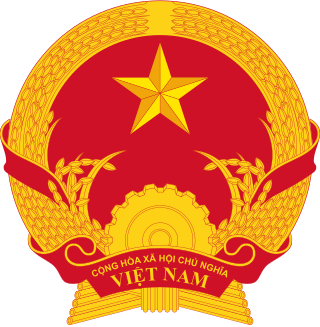
The politics of Vietnam is dominated by a single party under an authoritarian system, the Communist Party of Vietnam (CPV). The President of Vietnam is the head of state, and the Prime Minister of Vietnam is the head of government, both of these are separate from the General Secretary of the Communist Party of Vietnam who leads the CPV and is head of the Politburo and the Central Military Commission, thus the General Secretary is the de facto supreme leader of Vietnam. Executive power is exercised by the government and the President of Vietnam. Legislative power is vested in the National Assembly of Vietnam. The Judiciary is independent of the executive. The parliament adopted the current Constitution of Vietnam, its fifth, on 28 November 2013.

The Việt Minh was a national independence coalition formed at Pác Bó by Hồ Chí Minh on 19 May 1941. Also known as the Việt Minh Front, it was created by the Indochinese Communist Party (ICP) as a national united front to achieve the independence of the Democratic Republic of Vietnam.

Phạm Văn Đồng was a Vietnamese politician who served as Prime Minister of North Vietnam from 1955 to 1976. He later served as Prime Minister of Vietnam, following reunification of North and South Vietnam, from 1976 until he retired in 1987 under the presidency of Lê Duẩn and Nguyễn Văn Linh. He was considered one of Hồ Chí Minh's closest lieutenants.
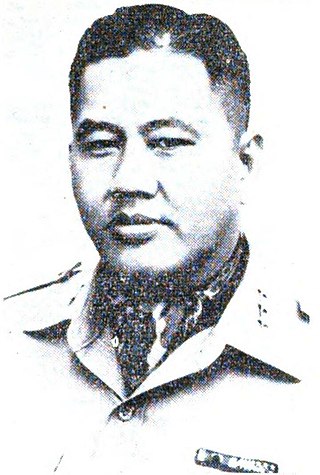
Dương Văn Minh, popularly known as Big Minh, was a South Vietnamese politician and a senior general in the Army of the Republic of Vietnam (ARVN) and a politician during the presidency of Ngô Đình Diệm. In 1963, he became chief of a military junta after leading a coup in which Diệm was assassinated. Minh lasted only three months before being toppled by Nguyễn Khánh, but assumed power again as the fourth and last President of South Vietnam in April 1975, two days before surrendering to North Vietnamese forces. He earned his nickname "Big Minh", because he was approximately 1.83 m (6 ft) tall and weighed 90 kg (198 lb).
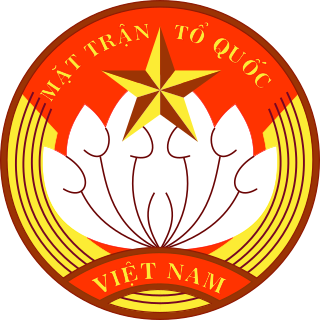
The Vietnamese Fatherland Front is an umbrella group of mass movements in Vietnam aligned with the Communist Party of Vietnam forming the Vietnamese government. It was founded in February 1977 by the merger of the Vietnamese Fatherland Front of North Vietnam and two Viet Cong groups, the National Liberation Front of South Vietnam and the Alliance of National, Democratic, and Peace Forces. It is an amalgamation of many smaller groups, including the Communist Party itself. Other groups that participated in the establishment of the Front were the Vietnam General Confederation of Labour, the Ho Chi Minh Communist Youth Union and the Ho Chi Minh Young Pioneer Organization. It also included the Democratic Party of Vietnam and Socialist Party of Vietnam, until they disbanded in 1988. It also incorporates some officially sanctioned religious groups.

The August Revolution, also known as the August General Uprising, was a revolution launched by the Việt Minh against the Empire of Vietnam and the Empire of Japan in the latter half of August 1945. The Việt Minh, led by the Indochinese Communist Party, was created in 1941 and designed to appeal to a wider population than what the communists could command.

Lieutenant General Sylvain Trần Văn Minh was a Vietnamese diplomat and a general of the Army of the Republic of Vietnam.

Trần Văn Chương was South Vietnam's ambassador to the United States from 1954 to 1963 and the father of the country's de facto first lady, Madame Nhu (1924–2011). He was also the foreign minister of the Empire of Vietnam, a Japanese puppet state that existed in 1945.

The Empire of Vietnam was a short-lived puppet state of Imperial Japan governing the former French protectorates of Annam and Tonkin between March 11 and August 25, 1945. At the end of its rule, the empire also successfully reclaimed Cochinchina as part of Vietnam.
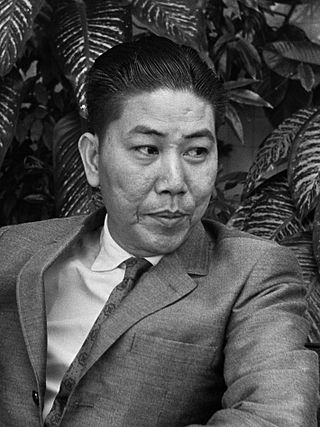
Nguyễn Bá Cẩn was a South Vietnamese politician who served as Prime Minister of South Vietnam from 4 April 1975 until 28 April 1975, serving under Presidents Nguyễn Văn Thiệu and Trần Văn Hương. Before becoming prime minister, he was a member of the lower house of the National Assembly representing Định Tường province and served as the second Speaker of the lower house.
Trần (陳) or Tran is the second most common Vietnamese surname after Nguyen. More than 10% of all Vietnamese people share this surname.
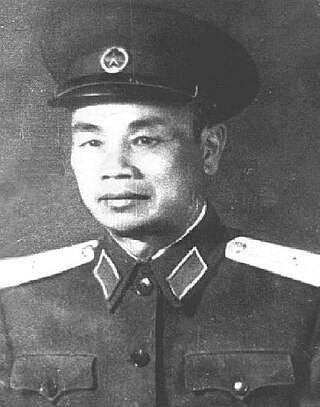
Trần Tử Bình (1907–1967) was a Vietnamese revolutionary who later became one of the first generals of the Democratic Republic of Vietnam (1948) and Vietnam's Ambassador to People's Republic of China (1959–1967).

Lê Văn Hưng was an infantry general of the Army of the Republic of Vietnam.
Nguyễn Văn Nhung was an officer in the Army of the Republic of Vietnam (ARVN). After joining the French Army in 1944 during the colonial era of Vietnam, he soon met and became the aide-de-camp and bodyguard of Dương Văn Minh, and spent the rest of his career in this role as Minh rose up the ranks to become a general. Nhung and Minh later transferred to the French-backed Vietnamese National Army (VNA) during the First Indochina War and he became an officer; the VNA then became the ARVN after the creation of the Republic of Vietnam. A soft-spoken man, Nhung was a professional military assassin best known for his role in the November 1963 coup d'état led by Minh that ousted President Ngô Đình Diệm from office.

Lê Minh Đảo was a Major general in the South Vietnamese Army of the Republic of Vietnam (ARVN). He commanded the 18th Division nicknamed "The Super Men", at Xuân Lộc, the last major battle of the Vietnam War.

The Vietnamese National Army was the State of Vietnam's military force created shortly after the Élysée Accords, where the State of Vietnam was recognized by France as an independent country ruled by Vietnamese Emperor Bảo Đại. It was commanded by Vietnamese General Hinh and was loyal to Bảo Đại. The VNA fought in joint operations with the French Union's French Far East Expeditionary Corps (CEFEO) against the communist Việt Minh forces led by Ho Chi Minh. Different units within the VNA fought in a wide range of campaigns including the Battle of Nà Sản (1952), Operation Hautes Alpes (1953), Operation Atlas (1953) and the Battle of Dien Bien Phu (1954).
The High National Council (South Vietnam) (Thượng Hội đồng Quốc gia) (8 September 1964 – 20 December 1964) was a civilian legislative assembly convened by the Military Revolutionary Council (MRC) led by the three generals Dương Văn Minh, Nguyễn Khánh and Trần Thiện Khiêm, under US pressure, after the First Republic led by Ngô Đình Diệm was overthrown by the military junta. Its ultimate objective was to prepare the constitution of the Second Republic of Vietnam. The Council consisted of 16 well-respected citizens: Nguyễn Xuân Chữ, Tôn Thất Hanh, Nguyễn Văn Huyền, Ngô Gia Hy, Nguyễn Đình Luyện, Nguyễn Văn Lực, Trần Đình Nam, Hồ Văn Nhựt, Trần Văn Quế, Lê Khắc Quyến, Phan Khắc Sửu, Lương Trọng Tường, Hồ Đắc Thắng, Lê Văn Thu, Mai Thọ Truyền and Trần Văn Văn.

Trần Đại Quang was a Vietnamese politician and former police general who served as the ninth President of Vietnam from 2016 until his death in 2018. After serving for five years as the Minister of Public Security (2011–2016), Quang was nominated by his predecessor Trương Tấn Sang to the presidency and was elected to the post by the National Assembly of Vietnam on 2 April 2016. He was one of the country's top leaders and ranked second in the Politburo behind Nguyễn Phú Trọng, the Communist Party General Secretary.

Nguyễn Văn Huyền was a Vietnamese lawyer and politician, who served as the last Vice President of South Vietnam in 1975. He took the position of Vice President at President Dương Văn Minh's request, who was trying to hold peace talks, but held the position for only two days before the fall of South Vietnam on 30 April 1975. He also served as the first President of the Senate of South Vietnam from December 1967 to January 1973. In the last years of his life, he was invited to join the Vietnam Fatherland Front of the unified Socialist Republic of Vietnam as an independent and was elected as a member of its Central Committee's Presidium, where he died in office in 1995.